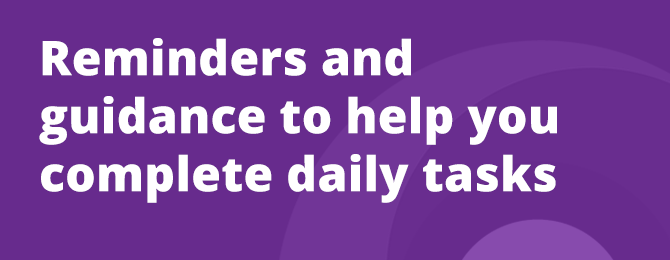Reminders and guidance to help you complete daily tasks

Staying independent and managing daily tasks can become more challenging as we age. For older adults, forgetting appointments, struggling to remember medication routines, or feeling overwhelmed by daily chores can be common concerns.
Common scenarios and concerns | Lifestyle and equipment options to help you |
|---|---|
Memory lapses: Difficulty remembering daily tasks or appointments. This can lead to missed appointments, forgetting medication, or neglecting important chores. | Low-tech reminders: Utilise calendars, whiteboards, or written notes. Tech-based reminders: Utilise smartphone apps, voice assistants, or digital calendars. |
Reduced organisation: Difficulty planning and prioritising tasks. This can lead to feeling overwhelmed, missing deadlines, and struggling to manage daily life. | Task management tools: Utilise planners, checklists, or to-do list apps. Visual aids: Use colour-coded systems or pictures to enhance memory recall. |
Sensory decline: Difficulty seeing or hearing can make following instructions or completing tasks challenging. This can lead to frustration, mistakes, and potential safety hazards. | Assistive devices: Utilise magnifying glasses, hearing aids, or amplified alarms. Simplify tasks: Break down complex tasks into smaller, manageable steps. |
Common challenges in remembering and completing tasks
- Memory lapses: Age-related changes in memory function can lead to difficulty remembering appointments, medication schedules, or even to-do lists. These lapses can disrupt routines and lead to missed deadlines or neglected tasks.
- Reduced organisation: Difficulty planning, prioritising, and organising daily tasks can be overwhelming. This can lead to feeling overwhelmed, missing deadlines, and struggling to manage appointments or activities.
- Sensory decline: Declining vision or hearing can make it difficult to see written instructions, hear reminders, or follow directions. This can lead to frustration, mistakes, and even potential safety hazards when completing tasks.
Equipment and aids to help you remember to complete daily tasks
Low-tech reminders
- Calendars and planners: Utilise physical calendars or planners to write down appointments, medication schedules, or important tasks.
- Whiteboards and sticky notes: Write down important reminders or tasks on a whiteboard or use colourful sticky notes placed in prominent locations as visual cues.
- Notes and reminders: Write down important information or create to-do lists on paper or in notebooks to keep track of your day.
Tech-based reminders
- Smartphone apps: Numerous apps offer features like calendar reminders, to-do lists, medication trackers, and even voice-activated note-taking to assist with memory recall and task management.
- Smart speakers and voice assistants: Utilise smart speakers like Google Home or Amazon Echo to set reminders, schedule appointments, or ask questions hands-free.
- Digital calendars: Utilise online calendars or sync your calendar across multiple devices to ensure all reminders and appointments are easily accessible.
Improving organisation and task management
- Task management tools: Consider using planners with daily or hourly schedules, to-do list apps, or project management software to organise and prioritise tasks effectively.
- Visual aids: Utilise colour-coded systems for different categories of tasks, or keep pictures or visual prompts associated with specific tasks to enhance memory recall.
- Break down complex tasks: Divide complex tasks into smaller, more manageable steps to reduce overwhelm and improve focus.
Addressing challenges with sensory decline
- Assistive devices: Consult your doctor about obtaining hearing aids or magnifying tools to improve your ability to see or hear instructions clearly.
- Simplify tasks: Consider simplifying complex tasks or seeking assistance with activities requiring good vision or hearing, such as reading detailed instructions or operating specific equipment.
- Ask for help: Don't hesitate to ask family, friends, or neighbours for assistance with tasks that have become challenging due to vision or hearing difficulties.
Additional things to consider
- Maintain a consistent routine: Establish a regular sleep schedule and stick to a daily routine as much as possible, which can help improve memory recall and overall well-being.
- Stay mentally active: Engaging in mentally stimulating activities like puzzles, reading, or learning new things can help keep your mind sharp and improve cognitive function.
- Talk to your doctor: If you're experiencing significant memory lapses or difficulty managing daily tasks, consult your doctor to rule out any underlying medical conditions and discuss appropriate strategies for support.
Where to buy equipment to help you remember to complete daily tasks
Plymouth City Council, NHS Devon, and Livewell Southwest have jointly commissioned NRS Healthcare to deliver the Safe+Well service, and they have over 2,500 daily living aids that you can purchase by mail order, telephone, or online.
View the Plymouth Safe+Well website
NRS has a dedicated phone line with a trained team of specialists who can answer any questions you might have. Just call 0345 6461860.
Other places to buy equipment from:
You might also like
- Free assessment tool: Select the area of difficulty that is relevant to you. You will then be asked a few questions to guide you towards helpful daily living aids.
- Free telephone advice line: Complete the online form, and we will contact you to arrange a convenient time to call.
Continue reading
- Independent Living
- Information and advice to help you remain independent
- How to request or buy equipment and aids to help you
- How to choose the right equipment
- Broken equipment and repairs
- Returning equipment you no longer need
- Financial support and grants for home adaptations
- Local suppliers for equipment and assistive aids

Is the information correct?
Let us know if the information on this page is wrong and needs to be updated.
Want to create a page on the Plymouth Online Directory? Register for free and add a page - it only takes a few minutes.




